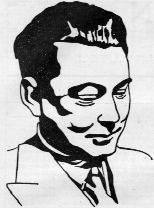The directory «Plots»
Jacobsen Jørgen-Frantz
(1900—1938)

Jørgen-Frantz Jacobsen occupies a distinct place in Scandinavian literature. He is the only Faroese writer to achieve international best-seller status. This status derives from his sole novel, Barbara: Roman (1939; translated, 1948), which has the added cachet of being one of the few Scandinavian novels to be translated twice into English within the space of fifty years. It was also adapted as a motion picture directed by Nils Malmros in 1997. These facts, together with Jacobsen's essays, a study of the Faroe Islands published in the guise of a travel guide, and a volume of his letters, are sufficient to suggest that had he lived longer, he would have been one of the outstanding literary figures in Scandinavia in the twentieth century. He must moreover be seen in the context of his being one of five Faroese writers, all born between 1900 and 1903, who represent a remarkable blossoming of literature in a country which had no tradition of literature in a modern sense. Jacobsen, together with William Heinesen, Christian Matras, Hedin Brú, and Martin Joensen, created modern Faroese literature, whether writing in Danish, as did Jacobsen and Heinesen, or Faroese, as did the others.
Jørgen-Frantz Jacobsen was born 29 November 1900 in Tórshavn. His father, the merchant Martin Meinhardt Jacobsen, had Faroese, Swedish, and Danish blood in his veins and, having been born and spent his childhood in Copenhagen, was mainly Danish speaking. His mother, Maren Frederikke Mikkelsen was thoroughly Faroese. Their home was thus bilingual, and, according to Heinesen, a distant relative, Jørgen-Frantz spoke Danish to his father and Faroese to his mother and siblings. In general, their extended family was interested in music and theater, and Jørgen-Frantz thus grew up in a highly cultured environment.
He first went to school in Tórshavn, where he took his middle-school examination. He began attending Sorø Academy in Denmark in 1916. His father died the following year, but Jacobsen continued his studies, passing his final examination and leaving school in 1919. Armed with this degree, he went to the University of Copenhagen to study history and French, but in 1922 he developed tuberculosis, and ill health prevented him from finishing his studies until 1932. After graduation he worked for two years as a journalist on the newspaper Politiken. He gave up journalism in 1934 in order to write a history of the Greenland monopoly--a work that he never finished, in large part because of continued ill health.
In 1927 Jacobsen was asked by representatives of the Faroese Students' Association to write a study of the relationship between the Faroe Islands and Denmark. The result was Danmark og Færøerne (Denmark and the Faroe Islands, 1927) a competent and well-written study that first examines the historical relationship between the two countries and then the cultural awakening of the Faroe Islands, with brief summaries of the works of the main figures concerned, finishing with a review of present-day relations between the two countries. Here, as elsewhere in his writings, he stresses the fact that the Faroese are not Danes, that their cultures and temperaments are quite different. Without being openly anti-Danish, he clearly reveals himself as an ardent Faroese nationalist.
His Faroese sympathies are also evident in his 1936 publication Færøerne: Natur og Folk (The Faroes: Nature and People), a warm, fond, and poetical presentation of the Faroe Islands, their scenery, their way of life, their history, their constitution, and their links with Denmark. The final section is a tour of the islands with a brief entry on each of the eighteen inhabited islands.
In 1943 Christian Matras collected and published a volume of Jacobsen's newspaper articles under the title of Nordiske Kroniker (Nordic Chronicles). Originally published between 1925 and 1937, the articles cover a wide range of topics, some of which are related to those in Danmark og Færøerne, while others have a wider cultural interest, as for instance the essay on the Faroese dance. The term "Nordic" is to be understood in a wide sense, including not only mainland Scandinavia and Iceland, but also Scotland. In these articles Jacobsen discusses the extinction of the Norse language of the Shetland Islands and examines the nature of Faroese as an independent language, ridiculing the suggestion that it is really only a dialect; in another essay, "Den yderste Kyst" (The Farthest Shore), he produces an outstandingly beautiful and poetical description of the outlying island of Mykines.
Denmark. Faroe Islands, 1988, Jørgen-Frantz Jacobsen
Denmark. Faroe Islands, 1997, Arrival of Poul Aggerso
Denmark. Faroe Islands, 1997, Barbara and Aggerso
Denmark. Faroe Islands, 1997, Barbara and men in boat
Denmark. Faroe Islands, 1997, Barbara in rowing boat